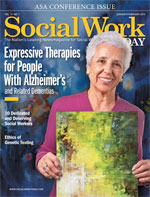|
What Is, Not What Isn’t Because of the rapidly rising number of older adults, the incidence of Alzheimer’s disease and dementias is also increasing. More distressing is the characteristic cognitive, memory, and language losses experienced by the individuals who have these conditions. There are no treatments that reverse or cure Alzheimer’s and related dementias, but there are medications and therapies that help delay and palliate the symptoms. Our cover story considers some nontraditional therapies directed not at correcting deficits but at making the most of the abilities that are often untainted by the losses that Alzheimer’s and related dementia typically involve. Expressive therapies such as art, music, dance/movement, and drama involve the emotions, imagination, and creativity that can remain intact in individuals whose memory, language, and cognition have been altered or stolen by these conditions. Some traditional practitioners may still be stuck in a mindset that misunderstands and undervalues the arts as effective treatments and may regard them as “fluff.” However, facilities are in the early stages of the culture change that will hopefully recognize that these nonmedical and nonpharmacological approaches are helpful and healing to people who still feel and imagine, regardless of what they remember, think, or speak. Social workers who understand the core value of strengths-based practice will understand how expressive therapies respect the creative abilities that people with Alzheimer’s and related dementias retain and how building on those strengths can help improve and enhance quality of life. The strengths-based approach acknowledges that everyone has assets and resources that may be recognized or unrecognized parts of a person’s life, but there is undeniable value in exploring them. As we start the new year, this issue also honors social workers who have demonstrated their commitment to helping individuals, families, and communities build on their strengths. Enjoy reading the stories of the 10 dedicated and deserving social workers who were nominated by their peers for outstanding service and reflecting in their work the core values and ethics of the social work profession. The best to you in 2014. |

 January/February 2014 Issue
January/February 2014 Issue